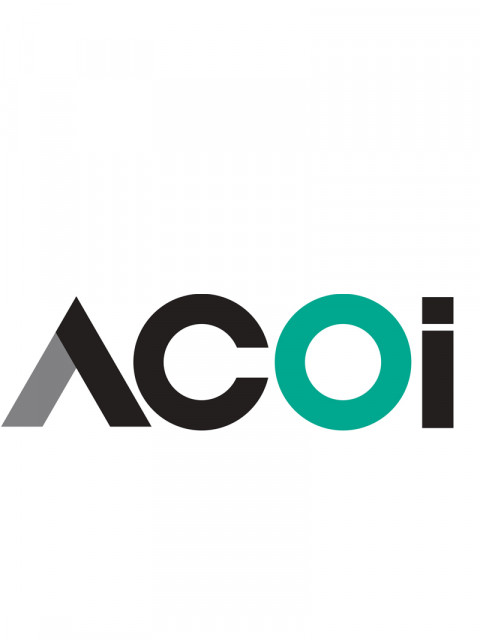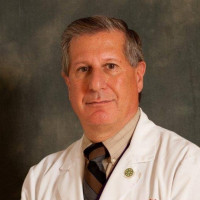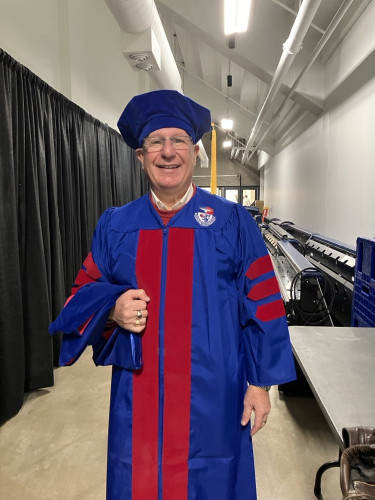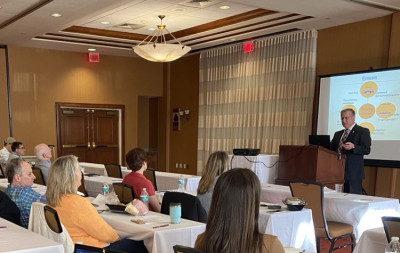
Dr. Dominic F. Glorioso Is on a Mission to Educate about Ethically Driven Palliative Care
by ACOI
July 15, 2024

As his career has evolved over the past four decades, he has continued to put a focus on education, and today, primarily instructs others on the principles of palliative medicine and bioethics, topics that he continues to invest in for his own education. He dipped his toe in the water when palliative care was relatively new and even before there were formal training programs for physicians wishing to pursue the specialty.
While the World Health Organization (WHO) formally recognized palliative care as a distinct specialty in 1990, hospitals across the US didn’t begin to embrace the idea of end-of-life care as a specialty until the early 2000s. Around that time, in 2003, Dr. Glorioso was asked to be the medical director at York VNA Hospice in York, PA. Two years later, in 2005, York Hospital sent him to Harvard University where he enrolled in a palliative care education and practice program.
“My shift to palliative care started with somebody believing that I would be good at doing hospice medicine. For a while I did both palliative care and internal medicine, but then I soon realized I had to make a choice. In 2010 I decided to do palliative care almost exclusively,” he says.
While the burden of guiding patients and families through the end-of-life process often falls onto the shoulders of a spectrum of professionals within the patient’s care team, formal training programs were often non-existent in the early part of this century. “There were no fellowship training offerings back then,” Dr. Glorioso says.
Filling the Gap in Medicine
His work took on new meaning as he began to understand the tremendous need around him. He views palliative care as his mission and consequently started teaching the principles of palliative care to help fill the gap in medicine. “I can't think of a specialty that doesn't deal with very sick patients at times, and we need training to deal with those patients better. We often see patients on the worst days of their lives and they're likely having real difficulties dealing with their new reality. The same is true with their families. We all need to be better at it,” he says.
Dr. Glorioso says that palliative care specialists can help, but that it’s important not to think of them as a substitute for the patient’s original care team. He is concerned that doctors often want to surrender their patients’ care over to the palliative specialists because they don’t want to deal with uncomfortable end-of-life conversations. Yet his biggest advice for his colleagues is to not disengage from their patients when their time comes. Instead, he says to view their role as a partnership with the palliative specialists.
“As palliative care physicians, we can help, but because we are involved it doesn’t mean that their own doctor(s) should step out of the picture. I have had physicians tell me that ‘this is what you know so why can't you just take over everything now?’ I know patients actually want to hear from their physician – after all, some have had relationships with their cardiologists, oncologists, or primary care physicians for years. We can do some of the heavy lifting in palliative care, but ultimately it is a partnership with the patient’s own care team.”
He says that the reason so many physicians hesitate to stay involved is that they feel they don’t have the proper communications skills. "People think that either you're born with good communications skills or you're not. And if you're not, there's nothing you can do about it. That is not true! Communication skills, like anything else, can be learned," he asserts, underscoring the need for robust training in this essential aspect of patient care.
Helping others learn more about working with patients facing end-of-life is the motivation behind Dr. Glorioso’s enduring passion to teach. In addition to his current role as Associate Medical Director at Amedisys Hospice Harrisburg in West Harrisburg, PA, he serves as an Assistant Clinical Professor of Internal Medicine at the newly opened Duquesne College of Osteopathic Medicine in Pittsburgh, PA. He not only imparts his lifetime of medical knowledge about palliative care, but it gives him another platform to emphasize the importance of communication skills at the bedside.
Palliative Care Meets Bioethics
In 2019 during an impromptu social encounter with a friend of a friend, Dr. Glorioso began considering an aspect of palliative care that piqued his interest – the field of medical bioethics. He had been on the lookout for what the next phase of his career would bring, and after learning more he discovered that bioethics fit the bill. It triggered his decision to pursue a PhD in Bioethics.
In medicine, where science meets humanity, the role of bioethics stands as a crucial guidepost for physicians navigating complex medical decisions and ethical dilemmas. Bioethics, as Dr. Glorioso explains, is more than a set of guidelines; it is the moral compass that guides physicians through the complexities of patient care. In his extensive career, Dr. Glorioso has witnessed firsthand how bioethics plays a pivotal role in ensuring that medical decisions are not only clinically sound but also ethically grounded.
For a physician who has been at the forefront of hospital-based palliative care programs and who has taught everyone from doctors and nurses to priests and family caregivers, what was he hoping to gain by attaining a PhD in bioethics? He says that his pursuit helped him discover different viewpoints that have shaped and refined his perspective on medical bioethics. After three years of study, he proudly earned his PhD from Duquesne University in December 2023.
“It was interesting for me being in the program at Duquesne because I had had a lot of clinical bioethics experience, whereas most of the students there were philosophy majors and hadn't had any real practical experience yet. So, while I learned a lot from them, they too learned a lot from me.”
“I saw a problem too. It seemed like the ethics books are written for other ethicists and not for people who are actually on the front lines in hospitals and in different health care settings having these conversations with patients and their families. So, I saw that there is some discord between the two – those who are writing the books versus those who are doing the ethics work.”
That’s when the idea of writing his own book on the subject came to him.
“Bioethics is a relatively new discipline, and it really helps define how professionals should behave when treating patients. It is in sync with how DOs look at medicine beyond just treating illness. Within the osteopathic profession we treat patients and their families holistically, so that's why I thought a book would be useful.”
“Everybody wants to try to do the right thing, but sometimes what the right thing is can be elusive. Bioethics helps to establish what to do when you face these dilemmas and how to proceed and helps to make sure that you're doing the right thing, and that's what my book is about. It's perfect for doctors, nurses, social workers, chaplains, anyone at the bedside. I wanted to write something that helps instruct people that are actually doing it.”
His upcoming book, A Practical Guide to Applying Ethical Principles at the Bedside, aims to bridge the gap between theoretical bioethics and its practical application in real-world healthcare settings. It will be published by Spring Publishing and may be available as early as the end of this year.

Dr. Glorioso to Lecture at ACOI 2024
Later this year he’ll be a faculty presenter at ACOI 2024 in Scottsdale, Arizona, October 30-November 2. Dr. Glorioso says he plans to delve into topics surrounding death and dying, aiming to demystify common misconceptions to foster open dialogue among healthcare professionals who often are hesitant to seek the information on their own. Dr. Glorioso's lectures are renowned for their blend of expertise and humor, making complex ethical concepts accessible and engaging to diverse audiences.
He said it's an honor for him to help educate his ACOI colleagues. Dr. Glorioso says he has fond memories of attending past ACOI Annual Conventions. “I remember bringing my family years ago when my daughters were just kids. It was always very welcoming to have your family there. ACOI always had activities for them. The Conventions were always beyond professional. I think the way ACOI focuses on not just the education, but the people that are getting educated, has been wonderful. It's a great organization!”
He also happily remembers ACOI colleagues like John Simelaro, DO, FACOI, and Thomas A. Cavalieri, DO, MACOI, whom he says greatly impacted his education. “The fact that these physicians would spend so much of their time, especially when they were in the height of their career, to lecture younger physicians—I just thought that was amazing.”
In recent years, Dr. Glorioso has observed significant shifts in healthcare delivery, particularly accelerated by technological advancements and the challenges posed by events like the COVID-19 pandemic. While telemedicine brought new efficiencies, he cautions against losing the human touch in patient care.
Looking ahead, Dr. Glorioso is optimistic about the role of artificial intelligence (AI) in healthcare, particularly in enhancing diagnostic accuracy and refining treatment protocols. However, he emphasizes the need for caution, ensuring that AI applications uphold ethical standards and mitigate biases in patient care.
For Dr. Glorioso, bioethics and palliative care aren't just professional obligations—they are moral imperatives that guide every aspect of his career and his teaching pursuits. From bedside care to educational initiatives and advocacy for ethical healthcare practices, his journey underscores the profound impact he has had in shaping compassionate and conscientious end-of-life care.


